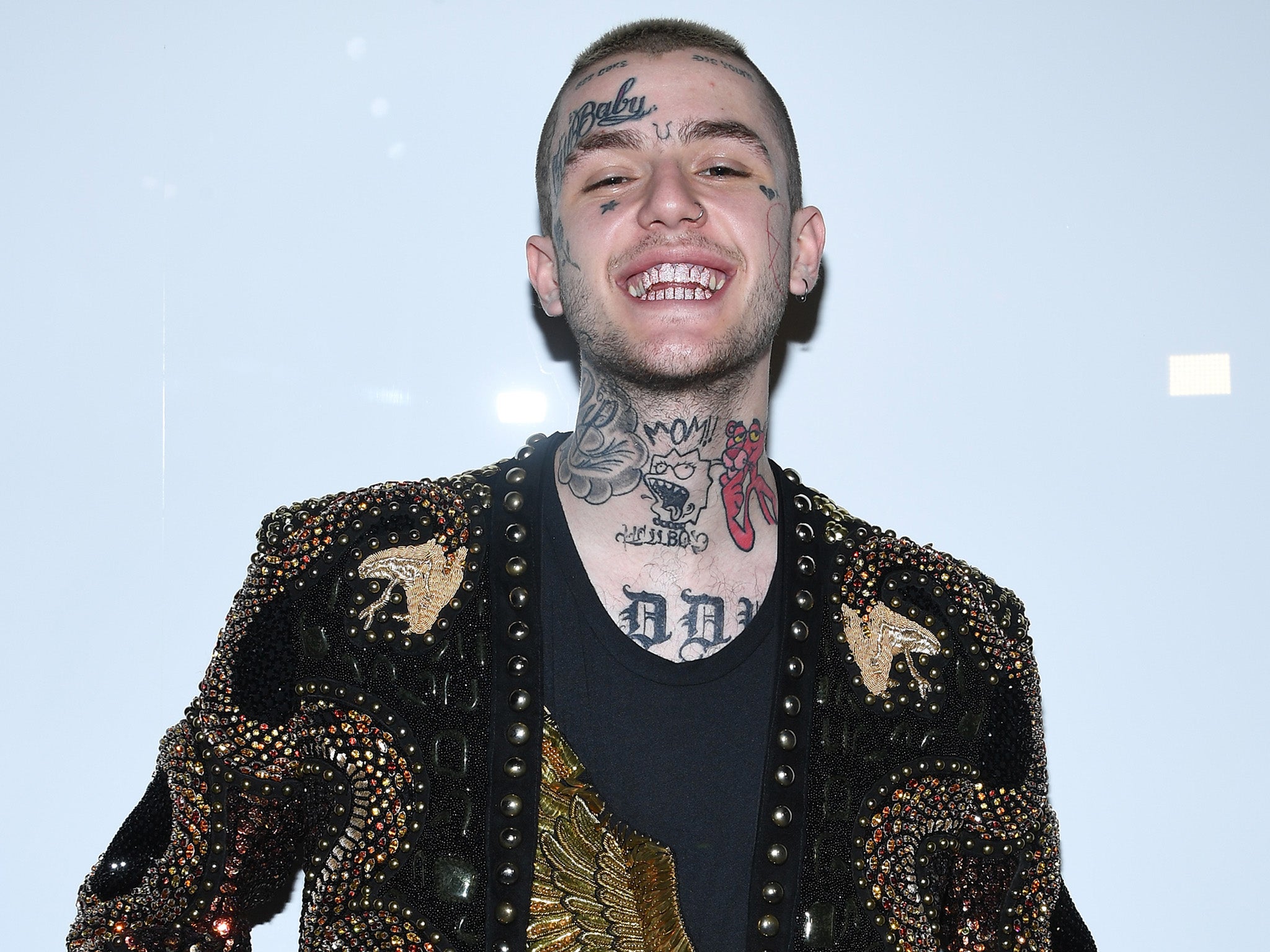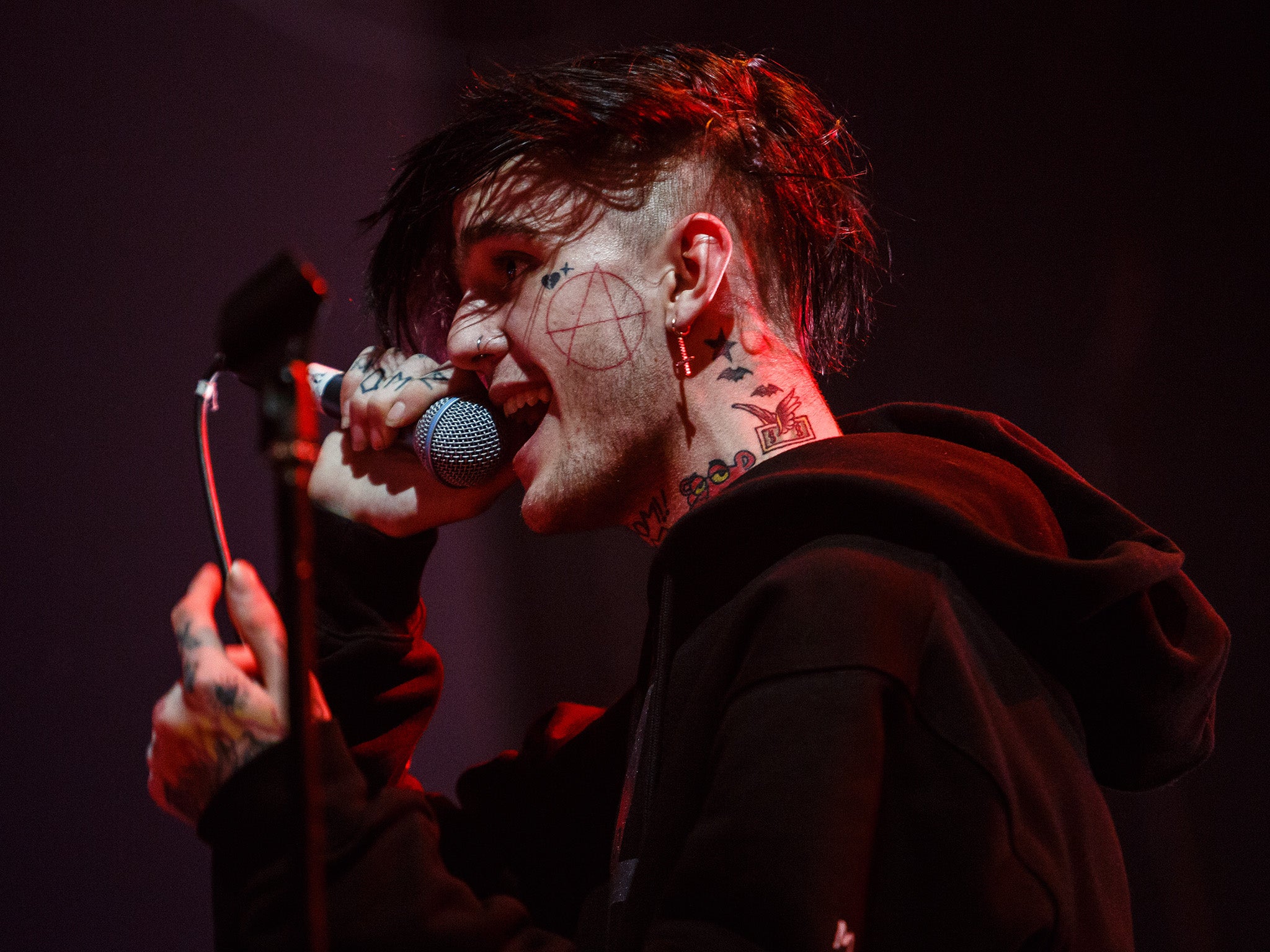Lil Peep: SoundCloud rap pioneer who fell victim to the drug use and depression his music highlighted
The American singer-songwriter and producer was on the cusp of becoming a household name having claimed the attention of fans and the press both in Britain and the US

Your support helps us to tell the story
From reproductive rights to climate change to Big Tech, The Independent is on the ground when the story is developing. Whether it's investigating the financials of Elon Musk's pro-Trump PAC or producing our latest documentary, 'The A Word', which shines a light on the American women fighting for reproductive rights, we know how important it is to parse out the facts from the messaging.
At such a critical moment in US history, we need reporters on the ground. Your donation allows us to keep sending journalists to speak to both sides of the story.
The Independent is trusted by Americans across the entire political spectrum. And unlike many other quality news outlets, we choose not to lock Americans out of our reporting and analysis with paywalls. We believe quality journalism should be available to everyone, paid for by those who can afford it.
Your support makes all the difference.Like many creative suburban misfits, Gustav Åhr, who has died aged 21, didn’t get on with a lot of people in his town. He spent much of his teenage years alone in his bedroom, listening to rap and punk records – and ever more obscure acts he sourced in far corners of the internet.
Åhr, better known by his stage name Lil Peep, was born in Pennsylvania and grew up in Long Island, New York. His parents were both Harvard graduates – they split up when he was a teenager.
Although the rapper and music producer achieved good grades, he rarely turned up to his lessons at Long Beach High School in Lido Beach. Eventually he dropped out, opting to study online instead. The course he chose required submitting one essay a week and even that his mother would often have to write for him.
At the age of 17, Åhr moved to Los Angeles in pursuit of a career in music. Under his new moniker, Peep released his first mixtape Lil Peep Part One in 2015. He followed this with an EP called Feelz and another mixtape Live Forever in the same year. More EPs followed in 2016, and he released his debut album Come Over When You’re Sober Pt. 1, shortly before his death in August. Music came easily to Peep. “It takes me like five minutes to make a whole fucking song,” he said in an interview with The Fader magazine in February.
Peep’s self-styled and memorable aesthetic opened doors for him. He had started getting tattoos at the age of 14 and gained Instagram fame for his distinctive look. He received catwalk invitations to Paris and Milan fashion weeks and was shot by Mario Testino. “They all say the same – that I’m edgy,” Peep told The Times in August. His notorious face tattoos featured the words “Get cake, die young” along his hairline, as well as “Crybaby,” the name of one of his songs, above his eye.
His music blends elements of trap, emo, grunge and southern rock and is often categorised as belonging to the genre “SoundCloud rap”. Although placed in a rap category, Peep’s use of melody in his debut album aligns him closer with rock. In general, his music is more reminiscent of alt pop/punk bands of the 2000s, like Fall Out Boy and Panic! at the Disco.

SoundCloud is home to a nation of rappers and what it means to be a SoundCloud rapper shifts as the ecosystem evolves. Calling someone a “SoundCloud rapper” can be an insulting or dismissive term used to describe a musician who creates mediocre or mundane music for an extremely small and insignificant audience, but there also exists a distinct musical genre of “SoundCloud” rap.
This genre’s ambient beats are characterised by an unpolished lo-fi sound, dominated by heavily distorted bass, and its artists’ punk rock personas and emotional lyrics that constantly reference suicide and prescription painkillers. This style of music is not only circulating on the platform but has entered the realm of mainstream record-label-vouched chart-topping music.
Along with many other artists linked to the Soundcloud rap movement, Peep performed unhappiness. He wrote songs for depressed teens with frank, emotional lyrics about mental illness. His 2016 track “OMFG” contains the line: “I used to wanna kill myself / Came up, still wanna kill myself / My life is goin’ nowhere / I want everyone to know that I don’t care.” When asked about the song in January, Peep told Pitchfork, “I have a chemical imbalance in my brain. I suffer from depression and some days I wake up and I’m like, Fuck, I wish I didn’t wake up.”
Peep also rapped about drug-taking and presented it in a way that was not always pleasure-less but was usually linked to his depressive tendencies and as a means of escapism, rather than straightforward hedonism. As witness the lyrics: “Gettin’ high ’cause my life don’t mean shit to me”; “I hear voices in my head, they tellin’ me to call it quits, I found some Xanax in my bed, I took that shit, went back to sleep.”
Along with marijuana and “purple” (or “lean,” a drink made from codeine-based cough syrup and sprite), Xanax – a benzodiazepine (“benzo”) often used to treat depression and anxiety – is a popular drug of choice referenced in “SoundCloud” rap. Fellow rapper Lil Pump celebrated a million Instagram followers with a Xanax-shaped cake; a group called the Cozy Boys – formerly known as Blackout Boys – had a Xanax bar-inspired logo; and even clean-cut Drake guest-starred on iLoveMakonnen’s track Tuesday, admitting to having “Xans in an Advil bottle” before reassuring us that “I don’t take them shits but you do.”
The stultified flow and numb production of SoundCloud rap replicates the anti-high of Xanax. It demonstrates a marked change in rap’s drug culture which previously depicted drugs as a means of getting pleasure or money, and ignored their use as a negative mode of escape. Depression and drug-taking have become so disconcertingly entwined that it is impossible to distinguish which artists are genuinely troubled and which, like the fake gangster rappers of the crack era, are appropriating the misplaced allure of drug-related pain.
Over 5 per cent of adults in the US take some form of benzo and an estimated 10 to 25 per cent of longtime users are dependent. Since 2000, the US has witnessed a 500 per cent increase in the overdose death rate. Michael Jackson, Elvis Presley, Heath Ledger, and Whitney Houston all had benzos in their system when they died. In October, President Trump directed acting Health Secretary Eric Hargan to declare the opioid crisis a nationwide emergency under the Public Health Services Act.
Use and abuse is growing in the UK also, where benzos are less readily available on prescription but sourced on the street or from the dark web and used by people to help bring them down after nights on other drugs they’ve taken. Though abuse isn’t on the level of the US, 366 people were killed by benzo-related overdoses in 2015 in the UK (compared with 9,000 in the US) – but that’s still higher than cocaine, speed, or MDMA.
In a flurry of haunting posts on his Instagram ahead of his final show, Lil Peep posted a photo of himself with an unidentified substance broken into pieces on his tongue. He filmed himself dropping bars of Xanax into his mouth. Last month Peep was found unresponsive in his tour bus ahead of a scheduled show in Tucson, Arizona. According to a toxicology report conducted by the Pima County Medical Examiner, he died of an overdose as a result of “combined toxic effects of fentanyl and alprazolam [Xanax].” It said that the “manner of death” was “accidental”.
Fentanyl is a prescription painkiller that gives relief from chronic diseases and is said to be 30 to 50 times as powerful as heroin. The Drug Enforcement Administration (DEA) has launched an investigation to find the person who gave the fentanyl to Peep. Officials are interested in a series of group Twitter messages allegedly sent by a woman named Mariah. One said: “Gbc [Lil Peep] high af because of me and my friend lol” and that he was “passed the fuck out” and “wouldn’t wake up”.
Before the report’s conclusion that ruled out suicide, Peep’s brother claimed it to have been an accident because his brother had been very happy prior to his death, adding, “He was so proud when he heard that there were people in the world who wanted to kill themselves, and then they didn’t because they listened to his music. He was helping people, he was not somebody who needed help… He was not as sad as people think he was. It’s frustrating as someone who remembers a happy brother.”
Peep’s two-year music career was impactful and memorials for the rapper took place on both sides of the Atlantic. On 2 December, Lil Peep’s face was projected onto the House Of Commons at midnight while on the same day his family and friends paid tribute to him at a service in Long Beach, New York. World-renowned DJ and producer Diplo tweeted: “Peep had so much more to do… he was constantly inspiring me” and 2017’s chart-topping rapper Post Malone said: “Your music changed the world and it’ll never be the same.”
Gustav Elijah Åhr, (Lil Peep), born 1 November 1996, died 15 November 2017
Join our commenting forum
Join thought-provoking conversations, follow other Independent readers and see their replies
Comments